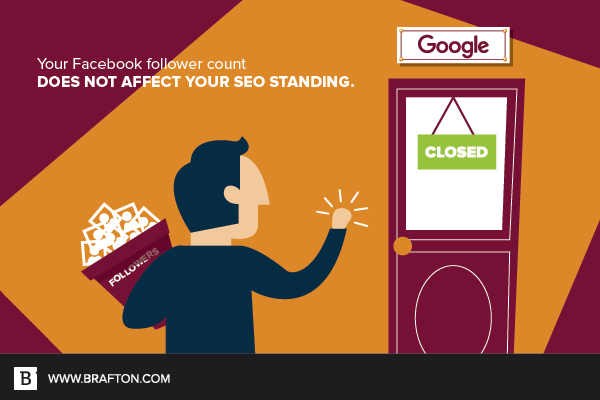Conspiracy theories come in all shapes and sizes. Some people believe we faked the moon landing. Others are convinced Shakespeare didn’t actually write any of his masterworks.
Marketers can lay claim to a newer conspiracy theory regarding social media marketing strategy. Namely, that Google is lying about social media’s impact on search engine optimization.
Put away your tin foil hats, folks, and let’s dive into the truth behind social media SEO.

Volatility and accessibility
Some of the mystery over whether social impacts SEO stems from the fact that historically, social media was considered a ranking factor for search engines. Since then, however, things have changed. As recently as 2016, Google said social does not play a part in SEO.
Google’s decision comes down to two primary factors: volatility and accessibility.
Social media updates and changes at an explosive rate, with millions of new posts being added across platforms each day.
Take Facebook, for example. The average Facebook user creates 90 pieces of content per month. Meanwhile, as of 2016, Facebook had 1.86 billion monthly active users. That translates to well over 167 billion new pieces of content per month. And that’s only on a single social media platform. Compared to this constant flux, websites change fairly infrequently.
Meanwhile, Google is limited in what it can index. Facebook pages are indexed but individual posts are not. Only a small percentage of Tweets are indexed.
“Because they don’t have full visibility into everything the way they do with web pages, it doesn’t make sense to use social as a ranking factor,” said Brafton Director of Digital Marketing Strategy Jeff Baker. “Google can’t verify how authentic something is. If a bad article blows up on social, Google won’t be able to apply its algorithms to see if it’s a quality web page because they can’t index it. They don’t want to have clickbait, low-quality articles show up in search engine results pages.”
So no, your Facebook follower count does not affect your SEO standing. The same goes for Twitter and other social networks.
“It’s better to view social media platforms as their own proprietary search engines,” Jeff said. “Sometimes they’ll intermingle with Google – like when a business’s Facebook page shows up in a search result – but that’s it.”

Secondary benefits
While social media may not be directly tied to SEO, that doesn’t mean it can’t help improve your visibility and drive traffic to your website.
Social is an invaluable top-of-funnel tool, helping you build credibility in the eyes of prospective customers. It allows you to introduce your brand and value proposition to new individuals. As audiences begin to visit your website more often, it will alert search engines that your site is popular, creating a positive feedback loop that assists with SERP ranking.
“It adds to brand credibility and relevance when customers see your social profiles and latest Tweets in Google searches.”
Additionally, by routinely sharing high-quality, valuable content on social platforms, you increase the likelihood of others linking back to your website. These external links are the most important factor for enhancing SEO.
What’s more, platforms like Twitter and LinkedIn make it easy to reach out to respected thought leaders in your space who may share your content with their own followers.
Finally, as mentioned earlier, Facebook pages and even some Tweets appear in Google SERPs.
“When someone Googles your business’s name, it adds to your brand credibility and relevance for them to see your social profiles and latest Tweets,” Jeff said.
Sorry to burst any conspiracy theory bubbles regarding social media marketing strategy. But hey, maybe a UFO really did crash in Roswell, New Mexico. Give it a Google to find out. Just don’t count on Facebook posts about Area 51 dictating the content you find.





